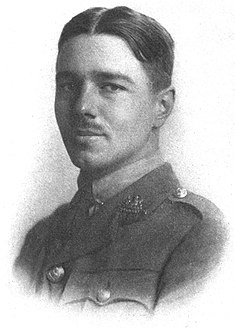Wilfred Owen
| Wilfred Owen | |
|---|---|
 |
|
| Born | 18 March 1893 Oswestry, Shropshire, England |
| Died | 4 November 1918 (aged 25) Sambre–Oise Canal, France |
| Nationality | British |
| Period | World War I |
| Genre | War poetry |
Wilfred Edward Salter Owen, MC (18 March 1893 – 4 November 1918) was an English poet and soldier, one of the leading poets of the First World War. His war poetry on the horrors of trenches and gas warfare was heavily influenced by his mentor Siegfried Sassoon, and stood in stark contrast both to the public perception of war at the time and to the confidently patriotic verse written by earlier war poets such as Rupert Brooke. Among his best-known works – most of which were published posthumously – are "Dulce et Decorum est", "Insensibility", "Anthem for Doomed Youth", "Futility" and "Strange Meeting".
Owen was born on 18 March 1893 at Plas Wilmot, a house in Weston Lane, near Oswestry in Shropshire. He was the eldest of Thomas and Harriet Susan (née Shaw)'s four children; his siblings were Harold, Colin, and Mary Millard Owen. When Wilfred was born, his parents lived in a comfortable house owned by his grandfather, Edward Shaw, but after the latter's death in January 1897, and the house's sale in March, the family lodged in the back streets of Birkenhead while Thomas Owen temporarily worked in the town, employed by a railway company. Thomas transferred to Shrewsbury in April 1897, where the family lived with Thomas' parents in Canon Street.
Thomas Owen transferred to Birkenhead again in 1898, when he became stationmaster at Woodside station, and the family lived with him at three successive homes in the Tranmere district, before moving back to Shrewsbury in 1907. Wilfred Owen was educated at the Birkenhead Institute and at Shrewsbury Technical School (later known as the Wakeman School).
...
Wikipedia
